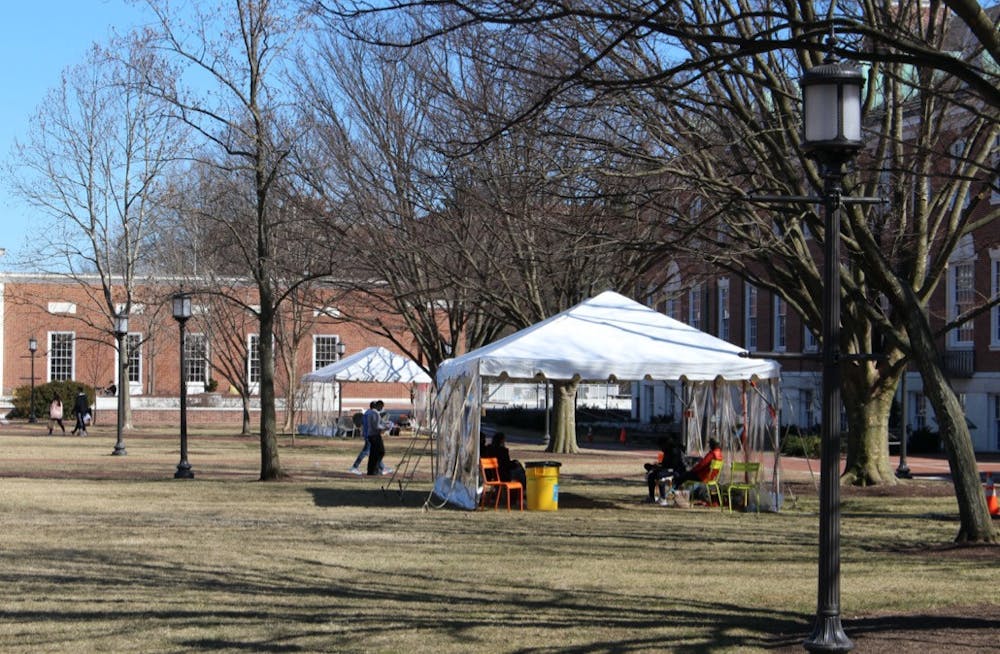The University hosted a town hall on April 19 to discuss its plans for the fall semester.
Vice Provost and Chief Risk and Compliance Officer Jonathan Links explained that the University will be entering Phase 3A, which includes masking, testing, enhanced ventilation and mandatory vaccinations. Administrators also confirmed that classes will remain hybrid; however, there will be a substantial shift toward in-person learning.
Freshman Harvey McGuinness, a member of the Student Advisory Committee (SAC), is optimistic about the University’s plans.
“The plan is well thought out and has balanced student opinions and facts in a way that puts safety first but also allows for a great expansion of that ‘return to normalcy,’” he said in an interview with The News-Letter.
Sophomore JiWon Woo, another member of the SAC, agreed that student concerns were taken into consideration by the University.
“The University tried its best to listen to students from all nine schools of academic division,” he said. “Our voice was adequately addressed, and since we can see the final product, we know where our input has worked.”
Woo emphasized that these guidelines are still subject to change depending on the public health situation.
Vaccinations
The University will require all students returning to campus to be vaccinated, a mandate that mirrors peer institutions. Though the mandatory vaccination policy currently applies just to students, the University is considering expanding it to all Hopkins employees.
As with the flu vaccine this fall, students must upload proof of COVID-19 vaccination. The Hopkins Hospital will also offer vaccinations to all Hopkins affiliates that are not able to receive a vaccine before returning to campus.
Links stressed the importance of vaccinations for the safety of the community.
“[Vaccines] are highly effective against severe illness, hospitalization and death,” he said. “While it’s not a 100% guarantee of safety, and while we will have other control measures in place in the fall, it’s an extremely important way to protect yourself and others.”
In an interview with The News-Letter, incoming freshman Hannah Puhov agreed that the only way classes can return to normal is if students are vaccinated.
“A lot of people won’t be too keen on going back if they aren’t able to get vaccinated,” she said. “Going to campus and having all of your classes online is not exactly the same as learning in person.”
Previously, the University had stated that if students receive vaccines that are not approved in the U.S., they would be required to receive another vaccine upon arriving to campus. However, this guideline was reversed and the University will not require international students to receive another vaccine.
Classes and on-campus activities
This past semester, work and social spaces on campus were significantly de-densified to reduce the risk of transmission. In the fall, however, these spaces will return to normal density.
Executive Vice Provost for Academic Affairs Stephen Gange explained that low transmission rates this past semester encouraged this decision.
“While we have not had in-person instruction like pre-pandemic levels, the University has been open and conducting in-person activities, and we have not seen any transmission of COVID-19 linked to instruction,” he said.
He added that the University has been conducting in-person research activities since last summer and has not observed transmission related to those activities.
In the fall, classes with fewer than 50 people will be held in person. Moreover, professors will not be required to provide online alternatives to in-person classes.
Freshman Kevin Wang, who is currently living in Canada, argued in an interview with The News-Letter that the University should provide online accommodations given that not all students will be able to return in the fall.
“I have friends that got their visa appointments canceled, and they can’t come this fall, which is a concern especially since all of the smaller classes are going to be in person,” he said. “The University doesn’t have to offer all courses, but enough so that they’re still able to graduate.”
Puhov stated that online classes should stay even once the pandemic is over, noting the increased accessibility they provide.
“It’s not that much extra work to set up a video camera that faces the professor and just upload [a video],” she said. “Even aside from COVID-19, there are students [with disabilities] who can’t make it to class every day. Now that we know classes can be held online, it should be an option.”
Housing and student life
Vice Provost for Student Affairs Alanna Shanahan explained that most aspects of housing will be returning to normal in the fall.
“We do expect to have nearly full capacity in our residential halls. The one piece of housing we plan to eliminate is our triples,” she said. “Otherwise, we do expect to be at full density with a full complement of resident advisors.”
Though sophomores were allowed to live off-campus this semester, the University will require all freshmen and sophomores to live on campus in the fall, reinstating the pre-pandemic requirement. The housing process will begin at the end of May, and the University expects to release housing assignments in July.
Shanahan noted that challenges with returning to campus for international students will be addressed on a case-by-case basis.
The University plans to open all dining halls and will still offer grab-and-go and online ordering options. However, according to Links, in-person dining options will remain limited.
Tentatively, freshmen will move in on August 21 and 22 and sophomores will move in on August 26 and 27. All students will be required to have a negative test before moving in.
Though he is wary of the University’s guidelines, Wang expressed his excitement about being able to enjoy campus life.
“It will really depend on how the situation will look in a few months,” he said. “But I hope that for the first few weeks at least, I will get the opportunity to explore campus, and I hope other students are able to do that too.”





